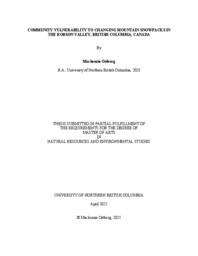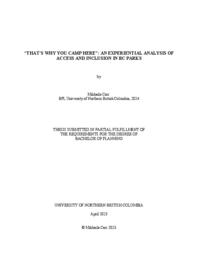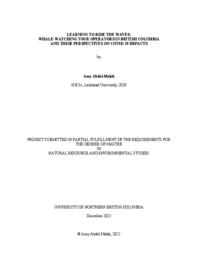Wigglesworth, Jennifer
Person Preferred Name
Jennifer Wigglesworth
Related Works
Content type
Digital Document
Origin Information
Content type
Digital Document
Origin Information
Content type
Digital Document
Description / Synopsis
It is well established in the literature that nature can provide a host of benefits to human health and wellbeing. However, access to outdoor recreation and nature-based tourism spaces remains inequitable, as park planning and management processes have not prioritized access and inclusion for all. Many studies have documented an overwhelming presence of physical, attitudinal, and informational barriers to accessing nature for persons with disability (PwD). These studies highlight an overwhelming presence of physical barriers and a lack of reliable and comprehensive accessibility information essential to enabling efficient trip planning processes. This research draws on the knowledge and lived experiences of a small group of people living with diverse impairments, in outdoor settings. Field observations utilizing a photovoice methodology and reflective journals were used to document interactions of PwD with (in)accessible nature spaces in two BC Parks regions. A thematic analysis of this data uncovered three emergent themes related to access and inclusion: the importance of access the key features, the availability of cognitive space to fully embody experiences, and information delivery on and off site. Findings from the project demonstrate how BC provincial parks might be experienced by individuals with a range of embodiments in nature. Place-based narratives using creative analytic practice weave the experiences of PwD in this research and objective standards data (e.g., measurements of infrastructure) to produce a diverse type of information that can enable trip planning processes for PwD.
Origin Information
Content type
Digital Document
Description / Synopsis
The COVID-19 era and related restrictions have impacted British Columbia (BC) whalewatching operators and their perspectives on whale-watching and tourism-government relations in BC. Despite the popularity and importance of whale-watching in BC, and its relative freedom from restrictions given its outdoor operations, tour operators had to negotiate dynamic constraints during the COVID-19 era. Federal and provincial government responses to the pandemic directly impacted whale-watching, for example, by changing the capacity or number of tourists allowed per vessel. Restrictions also impacted additional goods and services offered by some tour operators, such as refreshments. Adapting to such changes required a certain agility on the part of operators. Many operators also accessed key government supports such as loans and wage subsidies. This paper is based on a mixed methods research project centered on qualitative interview-based research and analysis. It was also informed by limited participant observation on whale-watching tours. Here, we present data gleaned from virtual interviews with 10 whale-watching tour operators. These operators represent approximately 1/4 of 39 active existing operators on and around Vancouver Island, British Columbia, Canada. We offer participant responses and greater response patterns with respect to: 1) how COVID-19 impacted whale-watching operations in BC, 2) what, if any, pivots or changes operators made in response, 3) which supports they accessed and their evaluations of them, and 4) their perspectives on the future of BC whalewatching. We begin with an introduction to: whale-watching in BC; COVID-19’s impacts on tourism as well as government responses to these; key concepts such as the Tourist Area Life Cycle, and ideas about how tourism weathers crises. We then present results highlighting key barriers, opportunities, and adaptations experienced by the tour operators, emphasizing their own words. We end by considering longer term implications for whale-watching in BC. This paper was written for both academic and applied audiences.
Origin Information




